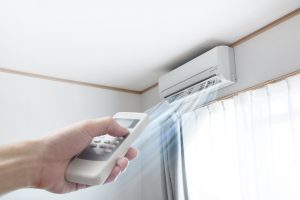If you’ve been considering a ductless mini split installation, you’re not alone. These systems have skyrocketed in popularity not only here in Belgrade, MT, but around the world as well. Although there’s no doubt that these systems can handle the challenges posed by extreme winter temperatures, some homeowners still wonder whether these systems are right for them.
If you’re not sure that a ductless mini split can handle both your heating and cooling needs, keep reading! We’ll go over a definitive list of ductless mini split system pros and cons so you can decide if the initial expense is worth the lifelong savings you’ll enjoy through superior performance and energy efficiency.
Ductless Mini Split Pros:
2-in-1 Systems
Ductless mini splits provide both heating and cooling which means you get two systems in one.
Energy Efficiency
The most lucrative selling feature of ductless mini splits is how energy efficient they are. They use heat pump technology to transfer heat from one place to another instead of generating heat like occurs in a combustion system like a furnace.
Incorporating Temperature Differential for Improved Efficiency
A crucial element often overlooked in heat pump operation is the temperature differential, or Delta T. This metric measures the difference between the outgoing and return temperatures in the heating loop, directly affecting efficiency. Heat pumps with a well-optimized Delta T reduce heat loss through return lines and decrease energy consumption by circulating lower water volumes. Understanding and designing for an optimal Delta T not only maximizes performance but also lowers operational costs, ensuring that heating needs are met without excess energy expenditure.
The Role of Refrigerants in Efficiency
The type of refrigerant in a heat pump plays a critical role in determining its temperature differential capabilities. While synthetic refrigerants typically require a lower Delta T, newer systems utilizing natural refrigerants like CO2 or propane can operate with larger temperature differentials. This allows for enhanced heat transfer without compromising system stability, delivering both sustainability and efficiency. Leveraging these advanced refrigerants can be particularly beneficial in commercial or industrial applications, where maintaining consistent temperature control is essential for cost-effective operations.
Zoning Capability
With precise zoning capability, ductless mini splits not only will save money, but also provide maximum home comfort. With an air handler in each room or zone of your home, you can heat/cool only one space at a time. This also allows household members who have squabbled over the thermostat to set the temperature to their preferred comfort level in their space.
Enhanced Air Quality and Health Benefits
Beyond temperature control, ductless mini-split systems actively improve indoor air quality by eliminating ductwork that can harbor dust, mold, and allergens. This creates a cleaner environment, especially for those with respiratory conditions. Many models also come equipped with advanced filtration systems to capture airborne particles, contributing to better health and comfort. Regular maintenance ensures these benefits are sustained.
Flexible Installation Options
Do you have an area of your home such as a garage, workshop, ADU, mother-in-law space, or a sunroom that has been impossible to temperature control? Problem solved! A single ductless mini split can be installed in those troublesome spaces, offering a practical solution for hard-to-heat zones. If you’re still exploring options, it may help to review the key differences between ducted vs. ductless heat pumps.
Optimized Performance in Extreme Climates
In areas with harsh winters or hot summers, mini-splits equipped with inverter technology adjust the compressor speed to meet varying temperature demands. This flexibility ensures reliable performance during extreme weather conditions while reducing energy consumption, preventing wear, and extending system lifespan.
Ductless Mini Split Cons:
Upfront Cost
The upfront purchase price and installation can be higher compared to traditional, ducted HVAC systems. That’s because you’re purchasing many pieces of equipment that must be installed by a professional HVAC company. Although the energy savings can be substantial over the lifespan of the system, some homeowners may balk at the initial expense.
Aesthetics
Some homeowners want their home comfort systems out of sight and out of mind. Although today’s air handlers are designed to be streamlined in appearance, some homeowners may see them as a major eyesore.
Maintenance Needs
You’ll need to be proactive about performing maintenance on ductless mini splits. In addition to cleaning or changing the filters for every air handler every 1-3 months, you’ll also need to schedule preventative maintenance twice a year. That’s because these systems operate year-round to provide heating and cooling. If your system starts underperforming, you might need to check if your mini split requires repair.
Contact Ambient Air Solutions today for professional ductless mini split installation in Belgrade, MT. Simplifying Heating & Cooling!

